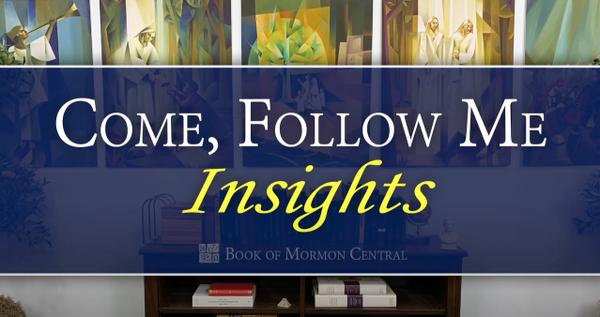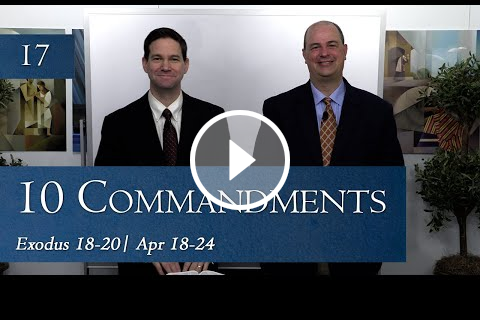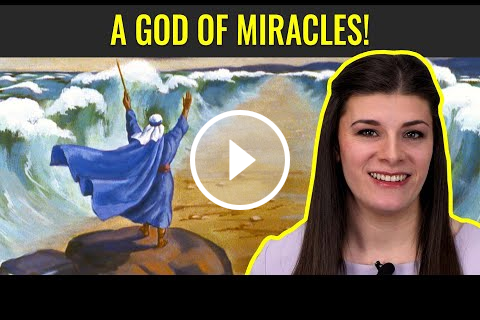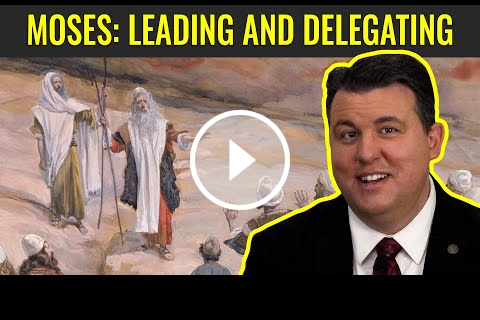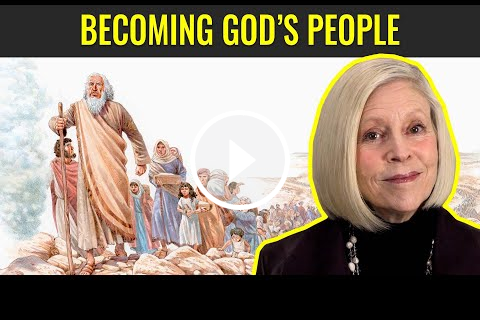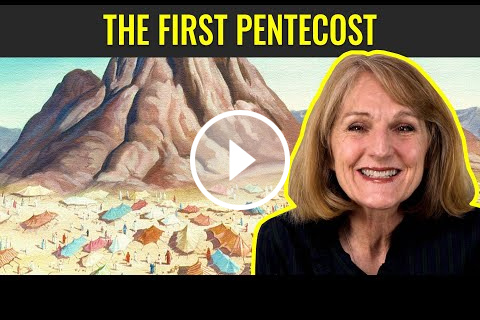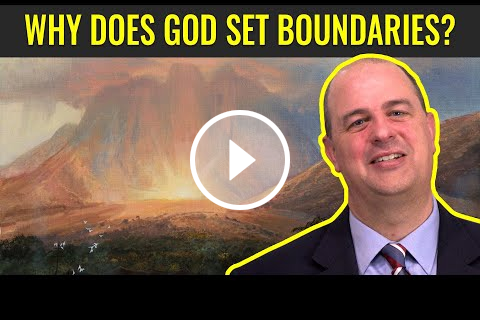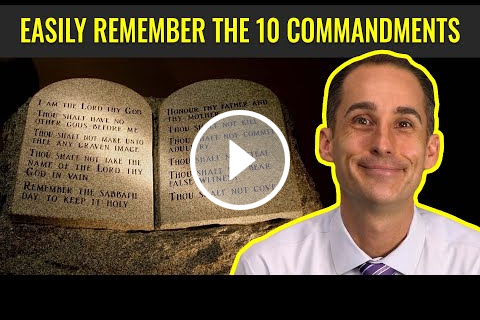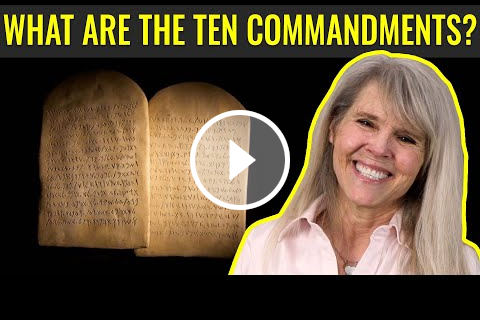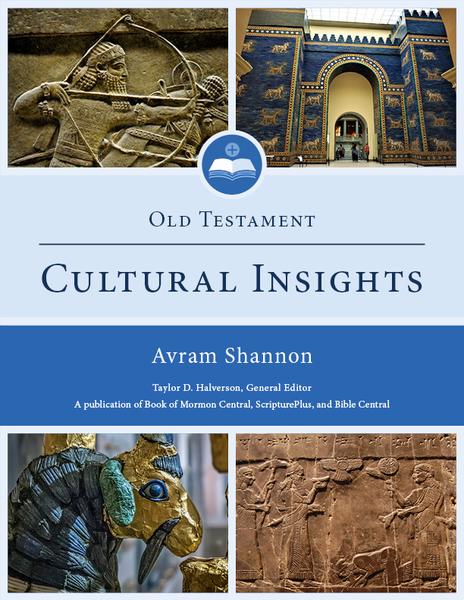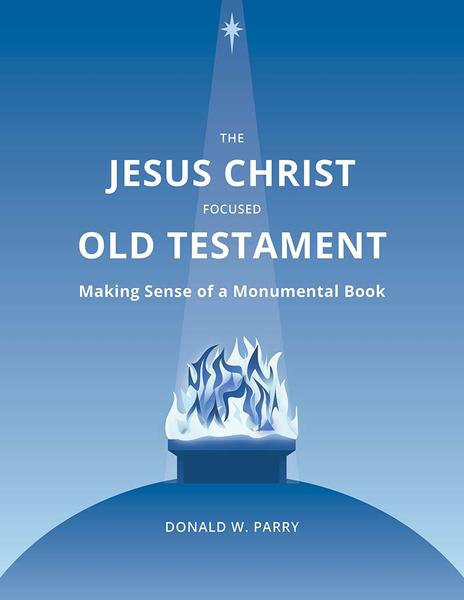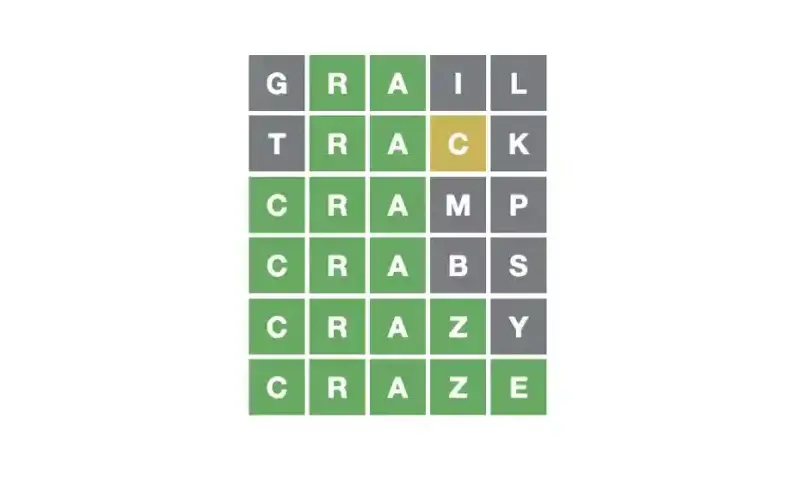Apr 18-24 (Exodus 18-20) Come Follow Me Insights with Taylor and Tyler – powered by Happy Scribe
I’m Taylor.
And I’m Tyler.
This is Book of Mormon Central’s Come Follow Me Insights.
Today, Exodus 18-20.
It’s kind of refreshing to only have three chapters, isn’t it, to cover because we can dive in and and really have some fun with these three chapters. So we begin in Chapter 18 with Jethro coming into the story. So remember, Moses had gone to Midian, where Jethro lives, married his daughter, has two sons. Then he had had his experience with the burning Bush, went back into Egypt. Jethro has not been in that picture. And so now we brought the children of Israel out and Jethro comes to meet them, bringing with him Moses’s wife and two sons rather.
Yeah. The story tells us about the names of these two sons. We talked about how the name is the lesson. I’m not sure the names are really the lesson for these chapters, but you hear that the word Gershaw means inheritance because Moses has received an inheritance. The people have received inheritance to God. You have Eliezer says, God was mine help. So God helps people in their need. So these interesting names. So studying this morning, I had this insight, just a perspective we might look at as we study this particular part of Exodus 18. You might compare it to other stories we have in Scripture, for example, the Nephi story. And we know that Nephi calls upon the memory of Moses and the Exodus on a regular basis. So if we turn actually to one Nephi, chapter four. So at this point, Nephi’s brothers had already failed at getting the plates. And what we might look at actually before I read this passage that like Nephi had been sent on this errand to let my brass plates go. Right. So Laban is like Pharaoh and Nephi is like Moses. And just like Moses goes to Pharaoh and says, Let my people go, Nephi goes to Jerusalem, goes to Laban and says, let the brass plates go.
And there’s these struggles where they don’t succeed at first. And Laban and Lemuel start murmuring and you get these really interesting passages. And I think for the sake of seeing the connections that Nephi has made for us in the Book of Mormon to these particular stories, we should read this verse one, and it came to pass. And I spoke to my brethren saying, let us go up again unto Jerusalem and let us be faithful in keeping the Commandments of the Lord. Remember, the word faith means loyal or covenantly connected, doing what God has asked for. Behold, he is mightier than all the Earth which we have seen already in the Exodus story. And we’ll see again in Exodus 19, God’s Almighty power that he uses to demonstrate who he is, that people will know him. Then why not mightier than Laban and his 50 Yea even than his tens of thousands. Therefore, let us go up. Let us be strong like unto Moses for he truly Spake under the waters of the Red Sea. And they divided Hither and Thither, and our fathers came through out of captivity on dry ground. And the armies of Pharaoh did follow and were drowned in the waters of the Red Sea.
Now behold, Ye know that this is true. And you also know that an angel has spoken unto us unto you. Therefore, can Ye doubt let us go up? The Lord is able to deliver us even as our fathers and to destroy Lebanon even as Egyptians. So a couple of things to look at here. Nephi is trying to convince his brothers, using scriptural testimony, that they might know that God is fully trustworthy the God of Abraham, Isaac, and Jacob will deliver people who are faithful. And that is the essence of the Exodus story that God delivers his faithful people. And if we look here at the Jethro story, particularly when we get to verse eleven, you’ll see the theme of knowing show up again where Jethro hearing these amazing stories of what God has done for his people, Jethro now knows he gets a testimony and we have to pause and say to ourselves, well, that’s interesting. I know how the whole story ends. We have to step back and say, Jethro didn’t know all this stuff. At one point, Jethro was essentially ignorant about who God was, his works. And through Moses he hears these incredible stories of Salvation, and he comes to know these stories have been preserved for us that we might know.
So things to look for in these stories today are the theme of knowing. And you might ask yourself, how do you know that God is God? How has he shown himself to you in your life? What evidence do you have? And you might also look at the power or the symbol of hand, which is a symbol of power. And you might also ask yourself, how do I know that I’ve seen God’s hand in my life? How has he revealed himself to me? How have I seen his power deliver me and others? All of these are forms of evidence to give you knowledge so that you can know that the Lord is God and he can deliver you. So I see these interesting connections going on. Verse nine in Exodus 18, Jethro rejoiced for all the goodness which the Lord had done to Israel, whom he had delivered out of the hands of the Egyptians. And Jethro said, Blessed be the Lord who hath delivered you out of the hand of the Egyptians and out of the hand of Pharaoh, who have delivered the people from under the hand of the Egyptians. Remember, the hand is a symbol of power, and it’s God’s hand that is the most powerful verse eleven, key verse here.
Jethro says, this is an expression of testimony. Now I know that the Lord is greater than all gods, for in the thing wherein they dealt proudly, he was above them. So these stories have been preserved to witness and to preserve knowledge of who God is. I want to connect it again to the Nephi story, similar to how Moses left, went out to save people. Nephi goes out and tries to save the brass plates. And when he returns, he meets with his parents. And you might think about the story of Sarah really interesting story. She only has two quoted speaking parts in the entire Book of Mormon. The first time she speaks it’s in complaint to Lehigh, worrying that her sons are going to die in the wilderness. Significantly, the second time she’s quoted, she speaks like Jethro in expressions of knowledge. Having heard what God had done to save her sons, she now has a testimony and knows that God will deliver his people. What’s beautifully significant about the way Surayah shares her testimony is that it’s laid out in a chaotic structure. This is an ancient Hebrew literary pattern or speaking pattern to focus emphasis on key themes.
So if we actually turn to First Nephi, chapter five, verse eight, we’ll put it up on the screen in a chaotic structure. I want to show you that Sorayah’s own name is the witness for what she now knows. Her name in Hebrew likely means something like the Lord is a commander or a Prince. And so I want you to look for the phrase the Lord commands, and then also think about what does a Prince or commander do? And let’s look at her testimony, which her own name seems to express her testimony. Now, I know there’s a theme again, and we see with Jethro and other parts of scripture that we gain knowledge by witnessing God’s axe of Salvation. Now, I know of Assurity that the Lord hath commanded my husband to flee into the wilderness. Yea. And I also know of Assurity that the Lord hath protected my sons, delivered them out of the hands of Lebanon, and given them power whereby they could accomplish the thing which the Lord hath commanded them. So you can see how we’ve highlighted that the Lord commanded the IH of Suraya’s name comes from the word Jehovah, or Lord.
And the SAR comes with the word commanded or Prince. And you can see what are the three qualities of a great commander or Prince? They protect, they deliver, they empower. So. Soraya’s name is a witness or testimony. What she knows that the Lord is a commander, the Lord commands, and when we obey, he delivers us. Now, one final insight on this. I wonder how much of Saria’s testimony influenced Nephi’s own life. I like to believe that Saria’s own faithfulness, her life, her testimony had deep influence on Nephi. And I think we hear this in what he says to Lehi when Lehi sent Nephi on this errand to go get the place. So this is a very famous scripture. It’s one Nephi 37. Now, as I read this, I want you to listen for the phrase the Lord commands, and then to remember that Soraya’s name in Hebrew may mean the Lord is a commander or the Lord commands. And what we may hear is that when Nephi is speaking his testimony to his father Lehi, in the original Hebrew, he may have been using his own mother’s name repeated three times, Surayah, Surayah, Surayah. So here’s the scripture came to pass, and I, Nephi said unto my father, I will go and do the things which the Lord hath commanded.
For I know that the Lord giveth no Commandments unto the children of men, save he shall prepare a way for them that they may accomplish the thing which he, the Lord commands them. So again, as I was preparing for today’s presentation, I had these thoughts that there’s these interesting connections that go on in scriptures about knowledge and testimony and seeing God’s hand in our lives. And yes, there are other people who have hands and have power, but ultimately it is God’s hand that has the greatest power. And the invitation for all of us is to not simply luxuriate in these great stories of knowing what other people know or seeing what they know, but seen in our own lives. How have we seen God’s hand? How do we know that God is there for us? How have we seen that when we keep His Commandments, he will deliver us as he’s promised? I think that’s one of the great invitations of what we’re reading about today in Exodus, chapter 18.
Isn’t that fun when you can find these connections between stories that seemingly are totally separate in totally different books? And yet Nephi is clearly harkening back to Moses and the Exodus story repeatedly as he’s telling his own story. And so it’s fun to make these intertestamental connections, these intertextual comparisons not so that we become just really smart scripture students of the scripture, but so that if we get better at seeing the connections on scripture page, my belief is that then we become more empowered to make the connection to our own life and to see how these stories become symbolic overlays for how God is commanding and providing and protecting and enabling us today with whatever our brass plate or get the children of Israel out of Egypt journey or command may be. I think that’s beautiful.
I love that connection.
Thank you. So when Jethro, right after he makes this grand statement of knowledge that he’s gained, you then get this fun little story where he watches one day in verse 13 came to pass on the Morrow that Moses sat to judge the people, and the people stood by Moses from the morning unto the evening. And when Moses father in law saw all that he did to the people, he said, what is this thing that thou doest to the people? Why sitst thou thyself alone? And all the people stand by thee from morning unto evening? So Jethro, is saying, you are creating this ultimate bottleneck, and all these people are standing in line basically to talk to you, what are you doing? And Moses is very innocent in his response. It’s a pretty good answer that he gives saying in verse 15, Because the people come unto me to enquire of God when they have a matter, they come unto me, and I judge between one and another. And I do make them know the statutes of God and his laws. Pretty good answer. But then, Jethro, the father in law has some really Sage advice for Moses, verse 17.
He says, the thing that thou doest is not good. Thou wilt surely wear away both thou and this people that is with thee, for this thing is too heavy for thee. And then he gives him this advice of providing verse 21, out of all the people, able men such as fear God, men of truth, hating, covetousness and place such over them to be rulers of thousands and rulers of hundreds, rulers of 50s, and rulers of ten s. And these people can judge these matters. And then if there’s a really difficult matter, it just keeps going to a higher judge until it Enos up with you with the most difficult matters that would come before the people. Now, if we pause here, it’s a fun little story. There are actually some pretty amazing lessons to be learned from Jethro and Moses in this scenario. For me, initially, one of the things that I love about this story is the fact that Moses didn’t look at his father in law and say, Time out. Who do you think you are? I’m the Prophet. I’ve seen God. I’ve brought the children of Israel through the Red Sea on dry ground.
I’ve had all these visions and manifestation. Why are you telling me what to do and how to run this operation out here? Not Moses. He’s very Meek, and I love that. I love that teachableness. I love that. Acknowledgment, you know what? I don’t have this all figured out. I was doing what I thought was best. But Jethro, thanks for the Council, thanks for the wisdom. Sometimes in our life, when you have somebody who can come from an outside position and observe certain things and just tell you what they noticed, that can be extremely valuable if we’re Meek and humble enough to say, yeah, I could learn from you and teach me. What have you observed? What have you learned?
We all have this opportunity. It’s about growth and progress. We might use the word repentance. Sometimes we think it’s such a strong word that we got to change things and we’re really bad. And repentance is simply just change. And so Moses repented. It wasn’t he had not committed a sin, but he realized, I can get better. And remember, we fought a war in heaven to have the opportunity to use our agency to get better and better. And I think, why would we not welcome insights or truth from wherever they come if God is a source of all truth and we don’t have all truth yet, but it’s scattered, right? I want to get it from everybody.
So one of the other lessons that I think is really insightful for us to gain from this little segment of the story is the reality that there are a variety of ways that people can learn and grow. Many years ago, Elder Neil A. Maxwell, in one of his talks, speaking to seminary and Institute teachers and CES employees, he shared this idea and he called it the four Es of learning. He said, we traditionally learn one of four ways, and they all start with E. In this context, he says, we can learn by exhortation, where somebody exhorts us to do something. He said, we can learn by explanation. And Elder Maxwell mentioned that in the Church, in traditional classroom settings and Church settings, we do a lot of these two explaining and exhorting. But then he said, we could use a little more of this third e where we teach by example, where people can learn from observation and watching both non and positive examples of what a principle looks like, it’s pretty powerful. But then he came to the fourth E of learning, and he said, this is the one that we need a lot more of allowing people to learn from their own experience.
So to me, this little interchange between Moses and Jethro is a great example of you have an individual Moses, who has been clearly called of God. He’s very wise, he’s connected with heaven, inspiration wise. He can judge very clearly, it seems, in most of these situations and handle all the problems that Israel can throw at his feet. The reality is there are many people in the tribes of Israel who could also grow and develop and become more connected with heaven and rely more on the revelation that comes and gain additional capacities, become a sharper instrument in the Lord’s hand if they were just given the opportunity to experience certain aspects of the gospel. And so Jethro is basically saying, let’s not have all of the children of Israel have to funnel through one person. Let’s divide this opportunity out and give other people the opportunity to learn from experience. And if you stop and think about it, this goes both ways. Meaning Moses was the one who was doing all of the praying and the pondering and the listening. And now you’re going to get a whole bunch of people who are given the opportunity to do that, connecting as well as more of the children of Israel will be able to get their questions and their concerns resolved because we’re not bottlenecked by one person.
And in the Church of Jesus Christ of Latterday Saints today, don’t you find it a beautiful pattern that we’re following this? We don’t go to the Prophet’s office with every question, nor do we go to the quorum of the Twelve with every question, nor do we go to our state President or our district President with every question. We go to relief society leaders and elders, quorum leaders and bishoprics and stake presidencies and area presidencies and the 70 and the twelve and the first presidency and ultimately the Prophet. It’s this beautiful set up where thousands and tens of thousands and even hundreds of thousands, if not millions of people are given the opportunity to learn from their experience as they counsel with people who are having struggles because now they have to do what Moses was doing exclusively. They get this opportunity to learn from their own experience in the process. And it’s not just the leader who’s learning from that experience, it’s the individual. There’s this joint effort to seek God’s will. And I think it’s beautiful as it comes off the page here to us to remember that it’s not just about doing the right thing as perfectly as possible in the Church.
It’s about growth. It’s about gaining new skills and new abilities and becoming a sharper instrument in the hands of the Lord, which takes time and opportunities to experience the gospel, not just hear about it and be invited to do it and get people’s explanations of it and see their examples. It’s to experience it. So in our teaching, what a beautiful pattern. If we use these three ease to invite and encourage and motivate people to then go and do something about what they’ve learnt and to connect with heaven in a very personal way. Moving forward now, we jump into Chapter 19 as we get ready to receive the Ten Commandments, which are going to come in Chapter 20. Moses is going to take multiple trips up to the top of Mount Sinai. Some people count seven, some count eight, others count fewer. Point being, Moses is going to go to great lengths and great efforts to commune with God and receive his will for these people as they’re camped here at Mount Sinai.
Yes. We see this theme of the effort that involves of having a relationship with God. Now, what? God is the God of the universe. Could he have come down into the Valley to hang out with Moses? Yes. Or could he have just sent the inspiration down into Moses brain and heart and soul? All of that is possible. What’s interesting is it seems that God is trying to make a very clear message to people about who he is and gradations of Holiness. There’s these boundaries that are set up. You have to be careful not to cross or transgress. That means to step over boundaries unless you are pure and worthy and ready. And God is trying to help the people understand gradations of Holiness so they can be prepared to be in his presence. And we still have that today, like God wants to be with us at all times. All people can fill his spirit. But it’s interesting. We also have a Covenant path gradations that you first enter through the waters of baptism, then you’re granted the gift of the Holy Ghost. Then we have temple ordinances. It’s almost like we’re invited higher and higher up the mountain into God’s presence, which ultimately is a celestial Kingdom.
So we have this all physically and symbolically laid out in Exodus 19. And I also just look at this overview, just the Thunder and the trumpets and the fire. This would have deeply impressed the minds of the people. They would have not forgotten. They would have known this is the Lord God. We lived in Egypt. There weren’t any Egyptian gods that had this kind of power and ability. So in this chapter, we see God setting a stage to introduce his Covenant to the people, his law, his Covenant instructions, and wanting to get their attention. You don’t have to feel like you need this experience in your life for God to get your attention or for you to be incumbent with God. But back then, anciently God was trying to make a Mary and impress upon people’s minds who he was. And I think he made the case. And yet at the same time, what do we see happens after this? The Israelites have years of murmuring and wandering. Even after these incredible experiences, they still struggle at times to hold on to what they need to be true, to lead them to do what was right.
So that’s a basic overview of Exodus 19.
It’s very helpful. So let’s jump in to verse four. As Moses has gone up to the Mount first time in verse three here. And then in verse four, he says, Ye have seen what I did unto the Egyptians and how I bear you on Eagle’s wings and brought you unto myself. So it’s this reminder of, I did that for you, and I brought you to me. I brought you out here into this wilderness where you’re not relying on all that stuff that you used to rely on back in Egypt, those flesh pots and the relative predictability of your servitude to Pharaoh. You’re out here because you’re now going to serve me. I brought you to me. Now, one of the most significant parts of the entire Old Testament record possibly comes next in these next two verses. Now, therefore, if Ye will obey my voice indeed. Now, did you notice that this whole covenantal connection begins with that word? Now? So he set the stage, I brought you out here, I brought you to me. Now, if those two letters, if this conditional statement, if Ye will, and then look at the conditions, obey my voice indeed, and keep my Covenant, then so notice that the if clause, the conditional clause has two conditions that need to be met.
If we will obey his voice indeed and keep his Covenant, then the outcome, the promised blessing is Ye shall be a peculiar treasure unto me above all people, for the Earth is mine. This peculiar treasure, this set apart, this dedicated special treasure that God has set up and tying it back into the Abrahamic Covenant. It wasn’t ever intended to be exclusive. The Covenant of Salvation is going to be found in this setting in this family. And everybody, all nations, kindred tongues, and people are going to be invited into that Covenant relationship with God by being adopted into that family if they’re not already in the family. It’s here where God has established this is going to be my peculiar people, a peculiar treasure. And then look at the very next verse, verse six. And Ye shall be unto me a Kingdom of priests and unholy nation. These are the words which thou shalt speak unto the children of Israel. Notice the wording you’re going to be unto me, a Kingdom of priests. So here’s the Prince of peace, the King of Kings, the Lord of Lords, who stands at the top of this Kingdom of his, and he’s saying, I’m going to make you a Kingdom of priests.
Isn’t that interesting? Living in the dispensation of the fullness of times where we don’t stop there, it’s been added upon line upon line, it’s even bigger and more glorious and grand than you read right here. As it comes to us in Exodus 19, that God isn’t just building a Kingdom of priests and a Holy nation today, our message to the world is we’re building a Kingdom of Kings and Queens, priests and priestesses. The gates to the Holy of Holies, so to speak. The presence of God have been thrown wide open. And the message is for all to come into the presence of God. Black, white, bond, free, male, female, all are invited to come into this amazing Covenant connection with God, which we need to pause here. Let’s talk about the word Covenant. We’ve hit on it multiple times, but here at the base of Mount Sinai, it’s very important that we nail down what is Covenant.
So let’s remind ourselves the creation was set in order so God could work out his covenants with his people. And the scriptures are preserving God’s covenants for us. So we use this word in English, Covenant. It comes from an underlying Latin word that means to come together. And you just might think about a beautiful relationship which God wants with us. He wants to come together with us, and a marriage relationship symbolizes this. We go to the temple, get married, and man and woman are brought together and they’re bound together by God, who wants to be bound to us. But if we go back to the original Hebrew, there’s an interesting word here. I’m just going to write the transliteration. It’s Barith. And that word is significant in a couple of ways. Now, people often talk about how this means to cut, but the better word is actually cleave. And if you think about it in English. The word cleave, like in geology, a rock might cleave, might actually break apart, be cut in half. But cleave also can mean to bind together. You might cleave unto somebody. We are told in Adam and Eve’s story that they are supposed to cleave onto one another.
So it’s interesting that cleaving, this one word actually has two diametrically closed meanings, to cut in half or to bind together. It turns out the ancient Hebrew word for Covenant has the same meaning. So anciently people would cut things like in the Abraham story, Genesis 15, he cut animals in half, he cleaved them in half so that when God walked through the cut animals, it was a way for God to say he wanted to be eternally cleaved to Abraham and his posterity and all the families of the Earth. And you get in the story of Captain Moroni where he Cleaves his garments in anguish that the people are not covenantly connected to God. And then the people come running together and they want to cleave themselves into a commitment that they will protect the people and protect the land. So if you think about covenants and you hear about covenants in Exodus 19 and 20 and throughout scriptures, it’s about cleaving. And then there’s also the underlying sense that we want to cleave together, be brought together with those that we love in these communities of bonded relationship. So that’s what the word barrier means in the underlying Hebrew, it means to cleave.
So without understanding of Covenant, Moses comes down off the mountain and in verse seven, he called for the elders of the people and he laid before their faces all these words which the Lord commanded him, I love how faithful Moses is to the Lord’s commands. You see this contrast throughout the stories moving forward, how Moses continually keeps going to the Lord. That pattern doesn’t hold true with all of the people that he’s trying to lead. Look what they say in verse eight. And all the people answered together. So this is a unified front from the collective body. They all answered together. What is their answered or what is their answer? They said, all that the Lord has spoken, we will do. And Moses returned the words of the people unto the Lord. It’s that we agree, we will be his people, he’ll be our God. And how long is that going to last? Well, we’ll see as we go down the road that this cycle of Covenant faithfulness versus breaking the Covenant, that what in the Book of Mormon tradition called the pride cycle is going to go again and again and again. They started by making the promise, but it’s obviously not going to last very long in this case out here in the wilderness.
So the Lord then gives new instruction to Moses to go into the people and sanctify them today and tomorrow and let them wash their clothes, clean the camp, get all ready, because on day three, God promises, I’m going to come, my presence will come down onto the Mount, and don’t let anybody touch the Mount, set up bounds. And so Moses went down in verse 14 to the people, and he told them everything that God had commanded. And verse 16, it came to pass on the third day in the morning, that there were thunders and Lightnings and a thick cloud upon the Mount, and the voice of the trumpet exceeding loud, so that all the people that was in the camp trembled. God’s got their attention. He’s come down in this glorious, powerful display of his might and Majesty. Notice verse 18, it says, And Mount Sinai was altogether on a smoke or covered with smoke everywhere. And the reason is because the Lord had descended upon it in fire and smoke. So then you get Moses going up to the top of the Mount again in verse 20. And verse 21 says, The Lord said unto Moses, Go down, charge the people as they break through unto the Lord to gaze.
And many of them perish. Now at this point, we need to pause, take a little time out and ask the question, what is going on? Why is the Lord doing all of this? It seems less efficient than, like Taylor had mentioned before, that there are probably simpler ways to accomplish what’s happening. I love the fact that God is working with these people from where they are. It’s the X plus one principle, the idea of God finding you where you are and then taking you to the next level. It’s not an X plus ten or an X plus 100 principle. God doesn’t do that to us. And so he’s working with signs, wonders, things that are going to help them progress on that Covenant path one step at a time. It seems slow, it seems laborious. It seems like a lot of up and down and a lot of perhaps unnecessary commands. But I love the fact that when you read stories like this, you have to remind yourself, God knows what he’s doing, and his thoughts and his ways are higher than man’s. And there is a divine purpose for everything that we see him doing, even if we don’t understand exactly all the ins and outs of what that divine purpose is.
Which now brings us into Chapter 20, where you get the famous delivery of the Ten Commandments.
So as we get into Exodus Chapter 20, it’s helpful to understand the covenantal context that structures this chapter. In fact, there’s a lot of covenantal context that structures much of the Old Testament, the New Testament, the Book of Mormon, and often the inspired Bible writers and prophetic writers in the scriptures don’t always tell us the Covenant of context. They just put it in and in their mind they knew all this stuff, and they sometimes don’t always say, oh, let’s stop and lay out the structure. So understanding this Covenant structure can hopefully help us to see larger meaning and purpose behind what God is doing and specifically the covenantal structure. For an if, then Covenant, as we talked about just a few minutes ago, follows a six part pattern. The first part is the introduction of the covenantal parties. You have to identify who’s making the Covenant, who’s offering the Covenant, and who is obligated to keep it. So what we first see is God himself. What does he do? Verse one. And God speaks all these words, saying, I am the Lord thy God, which have brought thee out of the land of Egypt, out of the house of bondage.
So God introduces himself, introduces the people. And in part two, he reviews all the great deeds that he’s done for the people. He summarizes it very quickly, but he reviews, I’ve done these incredible acts of loyalty and love. I therefore want you to love me back and be loyal to me. Now what’s interesting is once there’s been the introduction and the review of the great deeds of the person who is offering the Covenant, the next part is the stipulations or the Covenant instructions are offered. This is where people are told, okay, I, the Lord God, have done these things for you to be loyal. Here’s what I want you to do to be loyal to me. So it’s a set of covenantal instructions. Now I want you to look at Exodus, chapter 20, verse three to 17. What do you notice? Have you ever seen these verses before? What do we call them? They’re called the Ten Commandments. And what I want to point out is, yes, they are the Ten Commandments, but it turns out they are also the middle portion of a six part covenantal contract. And they’re the key portion of explaining how to be loyal to God.
Imagine in a marriage relationship, the spouse’s exchange lists with here’s what I would like for you to do for you to show me that you love me. And this is essentially what God’s doing. He’s giving a list saying, I’ve loved you guys. Here’s what I would love for you guys to do in return for you to demonstrate that you love me back. And here’s what he wants. Doubt shall have no other gods before me. It’s interesting. In the ancient Middle East where we have found similar covenantal instructions from Kings to their people, the Kings will say, I want you to have eyes for no other Kings, only for me. I want you to love me. Don’t love any other King. So you imagine an ancient King wanting to preserve the integrity of his nation. If some people are off, like hanging out with other Kings and making treaties with other Kings and other covenants with other Kings, the King of the land is going to struggle to maintain the integrity of his land. And so in these ancient covenants, these Kings will tell people, I want you to love me. Have eyes only for me.
We have this going on in the first commandment. God alone is who we make our Covenant with because he is the God.
The King over all the land.
It is his to give us. And if we want to live in the landlord’s land, we need to follow his instructions. And then we can go through and read the rest of the Ten Commandments. But all of them are specific instructions for how to show that we are loyal to God. Now what’s really interesting about this is God has updated his covenantal instructions from time to time and that’s one of the beauties of having modern day prophets and revelation is that God can provide updates on how we can show Covenant and loyalty and love to Him. I’d like to also point out that if you look at the Gospel of Matthew chapter one through five, it leads up to God providing updated covenantal instructions for loyalty and love back to Him. If you look at Matthew chapter one, it’s modeled on Genesis. It’s lots of genealogy. In fact, the first five chapters of Matthew are like the Torah, the first five books of Moses. So Matthew one is like Genesis. Matthew two is like Exodus, where it’s the people leaving Egypt, Matthew three, Jesus participates in priesthood ordinances that’s like the Book of Leviticus in the Bible.
It’s full of priesthood ordinances. Then you have the Book of Numbers in the Old Testament. It’s 40 years of wandering in the wilderness. What happens in Matthew four? Jesus wanders for 40 days in the wilderness. And then you have Deuteronomy where symbolically, Moses gets on a mountain yet again and delivers the Covenant instructions to the people and says, if you want to live in peace and prosperity in the land, you have to keep the Covenant instructions or keep the Commandments. What happens in Matthew chapter five? Jesus as the new Moses gets on a mountain and delivers the servant on the mountain. And he says, I say unto you. And he says, Moses taught you these things. Here’s what the Covenant instructions were. I now saying to you. Here’s the updated instructions. And he concludes with this powerful phrase, Be therefore perfect, even as your heavenly Father, even as your Father, which is in heaven, is perfect. Now, the word perfect is a powerful word. It means to be complete or goal oriented. It also could mean to be completely without blemish. But there’s also a covenantal meaning for the word perfect that is not often explicitly expressed in scripture that means to be loyal.
So if we read that scripture that Jesus shares with the people at the end of declaring all the updated Covenant instructions, he is saying to the people, Be therefore loyal. Keep the Covenant instructions I’ve delivered to you, even as your Father in heaven has been loyal to you based on the Covenant he made to Abraham, Isaac and Jacob, so the reason we share this is the Covenant of Abraham and the Covenant of Moses. These two major covenants Mount Moriah, Mount Sinai really animate and provide structure for so much of what goes on in scripture that God Himself made an unconditional Covenant to Abraham and all his posterity that he would provide blessings to them. And then the conditional Covenant with Moses and updated by Jesus, and there’s ongoing instructions with modern day revelation. If then if you do these things, you will have access to all that God offered to Abraham. Now there’s nothing any of us can do to ever break or destroy the Abrahamic Covenant that’s God’s Covenant. It is always there, but we can walk away from it. We can lose it for ourselves if we choose not to show God this Covenant of love that he has asked us to offer.
And we see this throughout the Book of Mormon. If Ye keep my Commandments, Ye shall prosper in the land. If you show me love and loyalty.
You prosper in the land.
If you keep the stipulations. If you keep the Covenant or contract.
You prosper the land.
That’s why it’s so important for us to know what does God want from us? And we have it spelled out quite clearly in scripture and in modern day prophets. So wherever we are in our lives, we can ask ourselves, how well am I doing to show that I love God and love my neighbor? Am I listening to the words of the living prophets and trying to be diligent at every day, just being a bit better at showing my love and loyalty to God? We don’t have to immediately be perfect in the sense of being fully arrived as we all hope to in such a Kingdom of God. But we all can be perfect in the sense of being loyal to God. We can all demonstrate every week at Sacrament that we want to be in this covenantal relationship with Him and that we are striving on a daily basis, even though we fail at times to be loving and loyal to Him faithful as much as we can be faithful at all times to show him that we want him to be our God. I’ve spent a lot of time focusing just on the stipulation side because this is crucial.
So the Ten Commandments again are essentially the key summary list of what God wants his people to show in faithfulness to Him that they are in relationship as we go on in the covenantal contract, you have witnesses. Just like today. If you ever sign a document, multiple people sign, it’s a way of ratifying the document. You then also identify what are the blessings and curses associated with keeping or not keeping the Covenant. And then eventually you get the document recorded and preserved in a sacred location. It turns out what became the tablets of the law, got put into the Ark of the Covenant and that was then put in the Tabernacle and then into the temple. Now it’s interesting, if we go back to the Nephi story, why did God want Nephi to get the brass plates? Because the brass plates contained the law of Moses or the covenantal instructions. And they needed those Covenant instructions. They needed the record so they could preserve it, so they could know how to show faith to God that they might receive all the blessings that he had offered. That’s why it was so crucial. It’s really interesting to me that in the launching of the restoration in the latter days, what did God first do?
He delivered the preserved record, the Book of Mormon, which preserves all these covenantal instructions. Before the Church was organized, before the priesthood was revealed, the Book of Mormon, the record was revealed, the covenantal record of God’s instructions for how we can be bound to him in Covenant and faithfulness and love that was given to us to launch the restoration. I just find that so compelling.
So beautiful, so building on that beautiful framework that Taylor laid out force for the foundation for these Ten Commandments, so that it’s not just random suggestions given to the people from Moses, but it’s actually our part of this agreement to be in this Covenant connection with God. I find it interesting that he starts with these Ten Commandments. By the time you finish with Deuteronomy, by the time the law of Moses is fully delivered, we’re going to end up with a total of 613 specific laws and Commandments. Very complicated, very outward oriented, very observable. It’s fascinating to me that God didn’t start here. He started with this. These are the ten things I want you to do or not do. And when the people prove unfaithful to those what happens? God keeps adding more and more and more laws to the agreement. And the Book of Mormon has some incredible commentary on why that happened. These people who looked beyond the Mark they wanted more than what God had given them. And yet when you get in the Book of Mormon story of Abennedi speaking to King Noah and his priests, I love the fact that he goes back he doesn’t emphasize the full array of laws within the law of Moses when speaking to King Noah and his people, he goes back to the ten that is his summation of the law of Moses, to wicked King Noah and his priests.
So if you look at these Ten Commandments, anybody who is willing to abide by these Ten Commandments, that God gives, it’s a guarantee that their life is going to be better than if they break any one of them or any combination of them. Look at the very first one. Thou shalt have no other gods before me. There’s only one God. And then number two, don’t bow down to idols. Don’t make Graven images. Number three, don’t take the name of the Lord in vain. Now often with that one. We assume in our culture today that means don’t swear, don’t use the name of God in a cursing sort of way or swear words sort of a way which is absolutely on the table. But I think there’s more to this than just not swearing. I think it’s connected more to don’t take the name of God in vain. Don’t promise you’re going to do things if you have no intention of doing them. It’s this for outward show, but your heart isn’t in the Covenant. And then number four, remember the Sabbath day to keep it Holy, and he ties it into this Godly attribute of creation, working for six days.
And then on the 7th day resting. And it’s amazing to watch how faithful Jewish practitioners in various sects of Judaism today, how they look forward to and celebrate and find great joy in Shabbat or the Sabbath, and what a pleasure and a delight it is for them. I think there can be some Holy envy there for us in the way that we approach the Sabbath day and how we remember God there. Then you’ll notice the remaining six Commandments are all focused on how we treat people and how we interact with other human beings. One through four is our relationship with God. So number five is honor thy father and thy mother that thy days may be long upon the land. Number six, thou shalt not kill. Number seven, thou shalt not commit adultery. Those beautiful relationships that are intended for husband and wife should stay covenantly loyal. Within that relationship, thou shalt not steal. And number nine, thou shalt not bear false witness against thy neighbor. We often associate that with lying. In this case, it’s clearly associated much more than just with lying. It’s deceiving for an intent, whatever that intent may be, a false witness against your neighbor.
And then verse 17 has the 10th command, Thou shalt not covet thy neighbour’s house. Thou shalt not covet thy neighbor’s wife, nor his man’s servant, nor his maid servant, nor his oxen or his Asin, or anything that is thy neighbors. It’s this covetous looking outward at what other people have, which induces this pride to say, I want what they have. In this comparison context, and you’ll notice in the New Testament when Jesus was asked, what is the greatest of all the laws, whether it be in that list of 613 or the list of the Ten Commandments, you’ll notice that Jesus concluded by saying, the greatest law is Love the Lord thy God with all thy heart, mind, and strength. And the second great commandment is like unto it, Love thy neighbor as thyself. If you look at the first four, that’s loving God, the last six that’s loving your neighbor all summed up in an overview summary. As we conclude these Ten Commandments, I think it’s important for us to recognize that the Commandments aren’t given as a punishment or as time fillers or as oppressive requirements. The Commandments are given as an extension of God’s Grace.
So people will often talk about, Am I saved by faith? Am I saved by works? Am I saved by Grace? And the reality is, it’s all part of this process that God has established for us. An extension of His Grace is the fact that he’s willing to give us Commandments, the fact that he’s willing to give us blueprints of how to live a more Christlike life, to become more Godlike in our existence. Here, the Commandments are not intended to be a thorn in our side or to limit us from having fun. They’re intended to liberate and to set free the captives. As we follow these Commandments. It’s a sign that we are going to be given more freedom, more Liberty, more agency to act down the road because we’ve proven faithful and covenantly loyal to that which God has already given us. So as you move forward in life as an individual or in a family setting or in a Ward setting, instead of seeing Commandments as restrictive, what an amazing thing to look at them as. What a delight to keep this part of our covenantal agreement with God. He is so faithful, and I don’t think he’s keeping his Covenant begrudgingly or in a frustrated manner.
And I want to be more like Him, which means I can look at all these Commandments and see which ones I may be struggling with the most or other Commandments that he’s given. And instead of begrudgingly, saying, okay, fine, I’ll work on that, but rather say, what a blessing. It’s amazing that God cares enough about us to give us this command. So dear Father in heaven, please help me more fully keep that command, that little part of this bigger covenantal connection with thee, because I want to be more like Thee. I don’t want to just keep that command so I can check a box and say, I’m doing the socially acceptable thing. As a member of the Church, I want to keep that command because I trust Thee. I love thee, and I want to become more like Thee. And I recognize that the path that you’ve given me through Grace and enabled me to walk is laid out in the scriptures in the words of living prophets, as I recognize those covenants, those Commandments, and those opportunities to learn, not just from listening to other people explain or exhort me about things of the gospel or even watch their example.
But now I get the opportunity to experience Covenant loyalty and faithfulness on that path that leads back to God. As we close this lesson today, just know that everything that God is doing is because of his love for us and his desire for our happiness. Oh, that we could reciprocate that back and have everything that we do be a sign of our love for him and of our desire to come closer to and become more like him. And we leave that with you. In the name of Jesus Christ. Amen know that your loved
you.
|
Here is your Come, Follow Me resource guide for Exodus 18-20. Don’t forget to download the ScripturePlus app for a guided reading plan and additional resources!
|
Come Follow Me Insights
Taylor and Tyler go in depth about our covenant relationship with God, compare the similarities of 1 Nephi and Exodus 18-20, and explain the meaning of the 10 Commandments.
|
|
|
Daily Come Follow Me Videos
|
|
Jasmin Gimenez Rappleye talks about the powerful miracles God has performed both in ancient and modern times.
|
Casey Griffiths teaches about prophets like Moses and Brigham Young who needed help and delegation in their leadership roles.
|
|
Marianna Richardson explains how the children of Israel were trained to become “God’s people.”
|
Lynne Hilton Wilson details how Exodus teaches us what to do to prepare ourselves for Zion and the Second Coming of Christ.
|
|
Taylor Halverson gives examples of times and places where God sets boundaries.
|
John Hilton III shows us an easy way to remember the order of the 10 Commandments.
|
|
Annette Marie Lantos Tillemann-Dick admonishes us to learn and follow the 10 commandments.
|
Study Deeper with Books on Bible Central
Old Testament Cultural Insights by Avram Shannon An important lens through which to understand the Bible is through its cultural context. The world of Ancient Israel and its neighbors is a rich tapestry of cultural and historical customs, traditions, and conceptions about the world around them. Brigham Young University professor Avram Shannon walks readers through pieces of the Bible that make more sense when looking at the larger picture of Israel’s culture.
|


